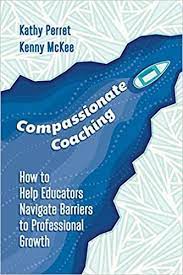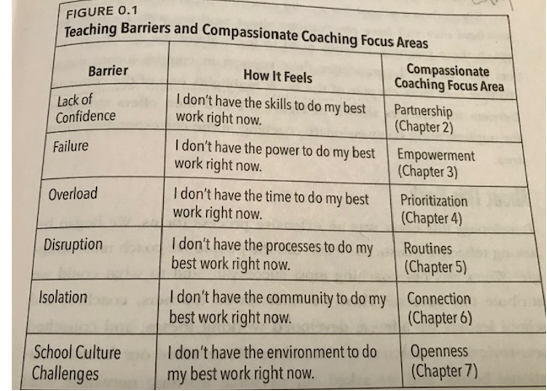[ad_1]
Compassionate Coaching: How to Aid Educators Navigate limitations to Professional Growth
By Kathy Perret and Kenny McKee
(ASCD, 2021 – Discover more)
Reviewed by Helene Alalouf

The answer: The design considering system mixed with steady and responsive guidance that provides knowledge and context to the adjust approach.
This reply arrived to me when conditions converged inexplicably nevertheless in a timely way in the identical week.
I attended a math coaching mastery webinar arranged and facilitated by Electronic Promise’s Neighborhood for Coaches to triumph over perfectly-identified obstacles. And then this gem of a book arrived in my mailbox – Compassionate Coaching: How to Enable Educators Navigate Obstacles to Specialist Progress.
The universe seemed to admit that I – a lifelong educator like you – will confront “barriers to expert growth” in myself and in those we mentor. We all want an empowering approach and substantial discussions to do the job towards methods.
Interactions Make any difference

Coaching is most gratifying when lecturers we husband or wife with attain success in employing a system that enhances their explicitness or nurtures college student engagement. Good progress takes place as “…good coaches foster supportive and productive interactions that boost pupil learning” (xvi) by as a result of the use of GPS:
● G=Objective: Co-developing our goal for student learning and/or educational apply, articulated as Sensible discovering targets which are crucial for successful classroom-centered coaching cycles.
● P=Strategy: Organizing strategic and targeted day-to-day steps so we are improved aligned to our priorities. This implies information-educated Action (p.38-39) for each the trainer crew and the coach, such as a College student Achievement System (p.41).
● S=Ways: Checking our Steps with autonomy and liable accountability in classroom-based coaching cycles.
Composed during the Covid pandemic, this toolkit for inside of-out skilled growth works by using a strengths-based appreciative inquiry system to have an understanding of and acquire the partnership and professional studying – fueled by core competencies like those people discovered for learners by the Collaborative for Tutorial, Social, and Emotional Understanding (CASEL) to overcome temporary situational limitations with appropriate techniques and tutorial techniques.
The guide is devoted to all of us, “to the coaches in our have life, formal and casual, private and experienced, who supported a expansion in the methods that make a difference, developed our self esteem, and coached us with compassion.“ (Frontpiece)
And are not all of us – as educators, moms and dads and close friends – coaches? Aren’t we all entitled to aid every single other to be the greatest we can be?
Preparing the Itinerary
To quotation the authors: “As Saphier and West (2009) produce, ‘Many educating troubles begin when academics really do not anticipate college student confusions, can not figure out how to scaffold required prior know-how, and do not cautiously feel about activities that would permit college students to access new expertise. In other phrases, a lot of educating challenges start off with inadequate and unskilled organizing.’” (Cited p.11)
Similarly, superior coaching calls for time for reflecting and organizing for lessons and collegial conversations with individuals and PLCs, looking into means, establishing formal expert studying periods, nurturing instructor leaders with inter-visitations and understanding walks, and a lot of other duties (p.57).
Though proclaiming that “Planning with the mentor has much more probable for enhancing instruction than any other exercise,” the authors advise that modeling and observations require co-setting up seem-fors and other take note-getting tools, placing up a reflective debriefing meeting ahead of time, using straightforward protocols and recognized routines for lesson review, examining university student work or observation knowledge, concentrating on what is very best for pupils and how to fix tutorial difficulties (pp.13-16).
“Examples of challenges that can profit from classroom observation in the course of the coaching cycle include lesson pacing, differentiation and equity, student engagement, questioning, alternatives to respond, college student collaboration, and classroom routines” (p.14).
Supporting Roles
Based mostly on the exploration about productive specialist improvement by Joellen Killion and Cindy Harrison (2006), the authors cite 10 distinctive roles that instructor leaders and coaches play in offering aid: 1. Source Supplier, 2. Educational professional, 3. Curriculum Expert, 4. Classroom Supporter, 5. Studying Facilitator, 6. Mentor, 7. Faculty Leader, 8. Knowledge Coach, 9. Catalyst for Modify, and 10. Learner.“
Compassionate coaching employs those people roles by concentrating on parts to overcome training limitations:
Be a Strengths-seeker!
● What helped you find out now?
● What got in the way of your learning now? (p.35)
The major mastering for me was threefold: refreshing my knowing of design thinking reframing adverse views positively and empowering and informing academics by presenting them choices on a coaching menu (p.81, 94-95)
What obtained in my way was next all the phenomenal backlinks and sources: these “time thieves” eaten several hours however, these abundance is manageable with the WSN framework’s three crucial concerns:
● What are the crucial factors?
● So what is so significant about them?
● Now what techniques do I choose to put them into apply?
Test WSN with the adhering to options from this toolkit.
● Twitter hashtags for educators and World Coaching on Twitter with the authors every Wednesday at 9pm EST.
● Myteachsource.ascd.org
● Math Language Routines
● Lesson strategy templates from hyperdocs.co
● Adrienne’s cost-free yoga routines on YouTube
● Appreciative inquiry, Boundaries or bridges, Consultancy, Affinity and so numerous much more protocols from Countrywide School Reform College offered at https://nsrfharmony.org/protocols
So now that I have shared the essential points and why these are vital, what actions will you acquire? If you’d like to study from and with colleagues, I hugely advocate you apply any of the helpful ideas and protocols in this expert companion.
Compassionate coaching triggers us to reflect on our follow and deliver planned steps to shift everyone’s performance. Let us navigate and conquer the obstacles alongside one another.
Because attaining her Masters from Academics College, Columbia College, and afterwards Nationwide Board Certification, education advisor Helene Alalouf relishes prospects to share her enthusiasm and informed fluency of investigation-evident ideas to make sure a effective finding out atmosphere, cognitively and affectively, to help educators and families in realizing their vision. At leisure she enjoys going for walks and cooking with family members and buddies, reading, and knitting.
[ad_2]
Supply link





More Stories
It’s Time to Embrace the Emotional or Affective Turn
How to Improve Employee Productivity
Administrative Advocacy with Laurie Chang and TpT School Access